Our history
“Starting to write a screenplay is like starting to build a house with no money, with none, only out of a desire to get rid of something, to have something that is yours alone.”
At first it was the gesture… MASCA THEATRE, vol. 1, 2010
Mihai Mălaimare
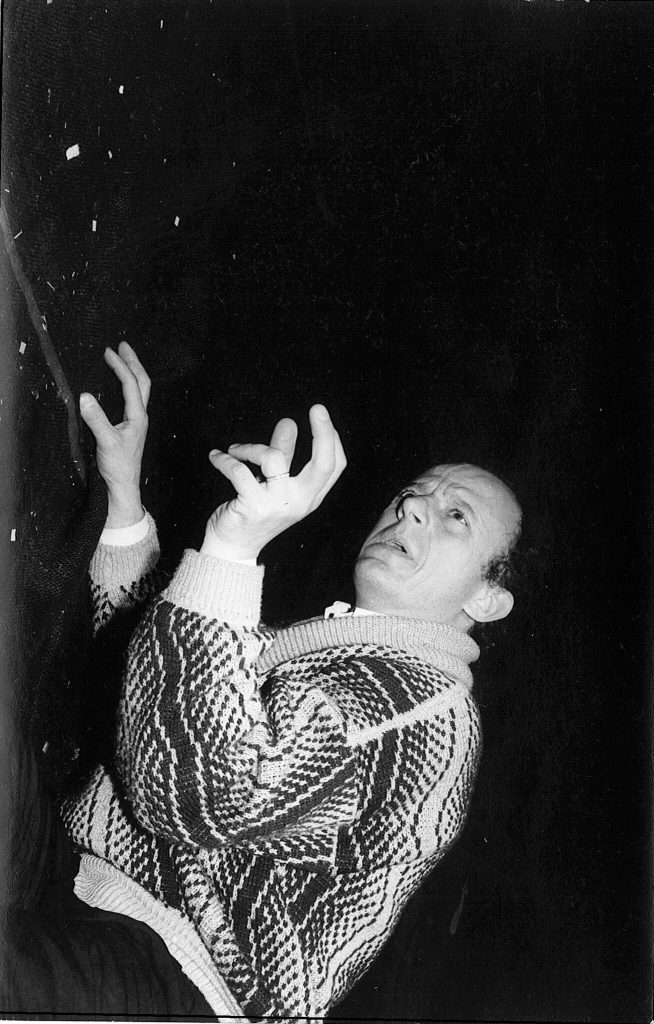
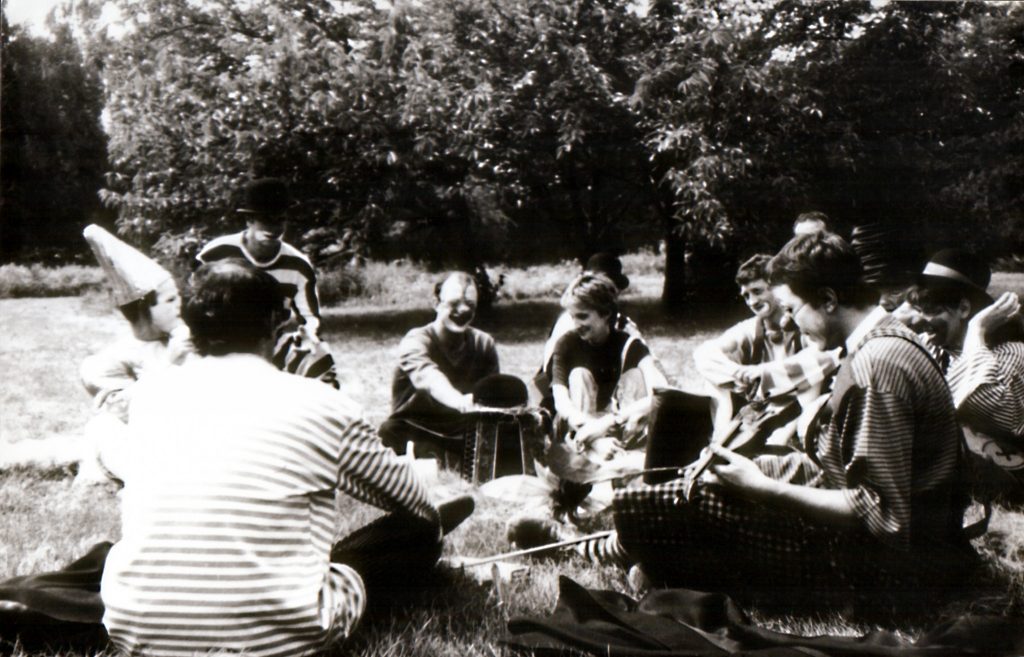
1990
The first page of our history was written on May 24, 1990, with the Government Decision for the establishment of the Masca Theatre, a theater of gesture, pantomime and corporal expression – the only theatrical institution with this profile in Romania. With a well-defined aesthetic program, but without a headquarters, Masca Theatre was born from the boldness and vision of its two founders, director Anca Florea and actor and director Mihai Mălaimare.
On July 1 of the same year, the Masca Theatre began to operate in the basement of a building in the Aviatorilor district, without any facilities. Rehearsals begin in a 20 square meter space, furnished by the team, with costumes from other theaters’ productions and borrowed sound equipment. Anamaria Pîslaru and Sorin Dinculescu, actors of the Masca Theater, are still part of the original core group.
The first performance of the Theatre took place in the open air, at the Café of the Romanian Literature Museum, on August 5, 1990, with the actors Anamaria Pîslaru, Dalila Gall, Sorin Dinculescu, George Țoropoc, Florentin Duse, Tudorel Filimon and Mihai Mălaimare. In the same period, Masca Theater makes its first tour in the country, in Costinești.
The year 1990 records the first two premieres of the Theatre: “Clowns” (written and directed by Mihai Mălaimare), on September 30, and “Medievals” (directed and written by Anca Florea) on October 29, both in the new hall set up by the actors of the company, in Str. Biserica Amzei. Moreover, in December, Masca Theatre is invited to its first international tour, the Festival Itinerant of Clowns, during which it plays in 12 cities in France.
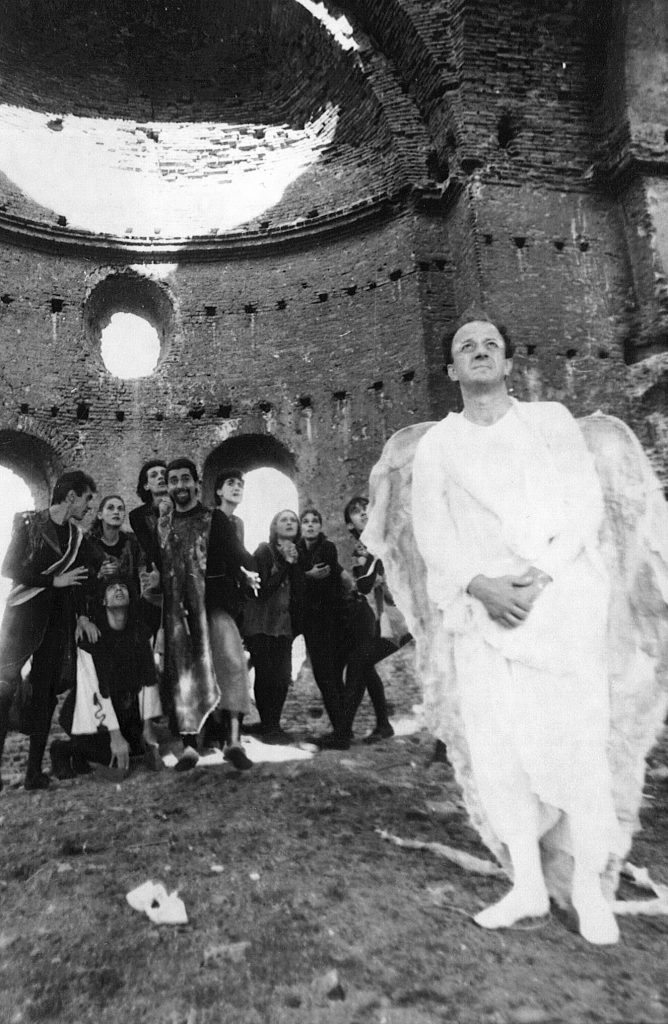
1991-1996
This period brings pivotal performances for Masca’s identity: “The overcoat” (directed and written by Mihai Mălaimare, 1991), “Death has died!” (written and directed by Anca Florea, 1992), “And the angel came…” (written and directed by Anca Florea, 1994) or “Promenade Concert” (written and directed by Mihai Mălaimare, 1996).
In the summer of 1991, Masca gave the first street performances in Romania, performed in the former National Theater, on Calea Victoriei, and the first theater performances in hospitals – a first in post-war Romania. This is the beginning of a tradition of charitable performance initiatives for children’s homes, medical facilities, schools for hearing-impaired children and old people’s homes.
The productions are presented, as the case may be, in international contexts such as the Cairo International Experimental Theater Festival (1991, 1992), Carthagina Theater Days (1991), Istanbul International Theater Festival, Leipzig Festival of Alternative Theater (1993), Skopje International Festival of Alternative Theaters, Romanian Culture Festival in the United States of America at Lincoln Center in New-York, Washington and Philadelphia (1995), the International Festival of Image in Budapest, the International Festival of Alternative Theatre in Bratislava (1996), or the tours in Hungary, Slovakia, France, Luxembourg, Bulgaria, Albania, Germany and Belgium.
Despite the international acclaim, these years are marked by uncertainty and instability regarding the theater’s location. In September 1992, lacking its own space and the possibility to rehearse and perform, the theatre troupe organized a protest against the indifference of the authorities – which turned into 15 days of rehearsals and open-air performances in Victoriei Square. Out of this revolt, the specific street theater that defines Masca Theatre for a long time is born.
The first open-air season of the Masca Theatre took place in parks and on the street between March and October 1993, doubled by a series of tours in the country – an approach that continued until 1995, when the Masca Theatre was assigned the “Pacea” Cinema in Militari, an unused and, at that time, unusable building. One year after the issuance of this Decision, in August 1996, the Theater’s team moved into the newly-renovated building – at this stage, without windows, without light or sanitary facilities, without heat and without storage space for the sets.
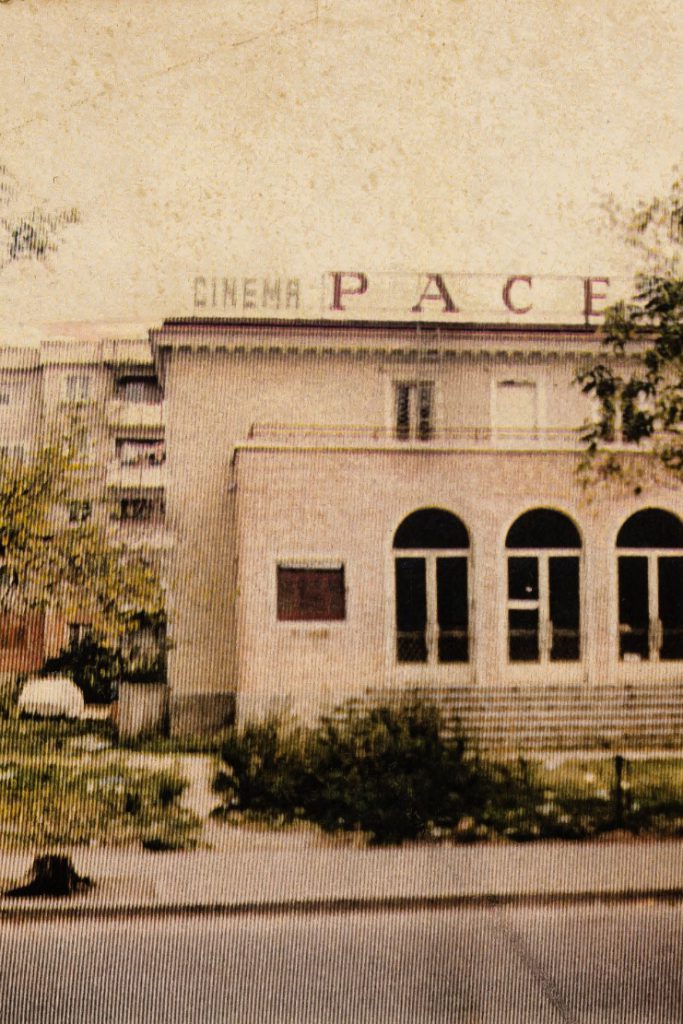
1996-2004
We inaugurate the still unfurnished space of the former Cinema “Pacea” with the premiere of “Christmas Story” (December, 1996). The spectators watch the show standing, warmed by a borrowed diesel stove. Until the end of the 1996-1997 season, the Militari venue is used for performances, but also for the Red Noses Festival, the first clown festival organized in Romania. Uverturii, to start the consolidation and refurbishment works. Thus, Masca Theater returns to its first stage: the street.
In spite of the conditions, the Masca Theater’s palmares enriches and diversifies: “The Parade” (written and directed by Mihai Mălaimare, 1998), “Song of a clown” and ” The Cabaret of Nations” (1998), “Another promenade concert” (1999), “Monsieur de Pourceaugnac” (directed by Mihai Mălaimare, 1999) – a return to the text after 10 years of nonverbal theater -, “Stories from Romania” (2000) – a show prepared for the participation in the World Exhibition in Hanover -, “The Romanians” ( written and directed by Mihai Mălaimare, 2001), “Fair in Paris” (written and directed by Mihai Mălaimare, 2001), “Georges Dandin” (written and directed by Mihai Mălaimare, 2001), ” The Merry Guardians” (written and directed by Mihai Mălaimare, 2002), “European Cabaret” (written and directed by Mihai Mălaimare, 2002), “Human Stupidity” (written and directed by Mihai Mălaimare, 2003), “The town, the people and the mountain” (2002) – the first theater-exhibition show in Romania, “Actors rehearsing” (written and directed by Mihai Mălaimare, 2003), “Harlequin’s Hoax” (directed by Mihai Serghei Tudor, 2003), “What do you think about love?” (directed by Cristian Rotaru, 2004), “The Intruder” (directed and written by Mihai Mălaimare, 2004), “Statuile” (written and directed by Mihai Mălaimare, 2004), “Love in Bucharest“ (written and directed by Mihai Mălaimare, 2005), “Bach in the neighborhood” (written and directed by Mihai Mălaimare, 2005), “The Mirror” (written and directed by Mihai Mălaimare, 2005).
These shows were performed in open-air seasons, in parks in Bucharest, but also on the road. In June 1999, Masca Park was inaugurated, a children’s park in the Militari neighborhood, later dismantled.
The year 2000 brings the prospect of a new space: the building of the former cultural center “Brotherhood among the Peoples” in the Bucharesti Noi neighborhood – a space that was taken into administration, but which turned out to be impractical: the downstairs space was arranged to serve as a disco, and the upstairs one, as a university lecture hall. Masca Theatre celebrates its 10th anniversary with the Bucharest public in Herăstrău Park, where it also organizes the second edition of the Red Noses Festival.
This approach is followed by a series of open-air events, some of them exceeding five editions: the “Moliere in the neighborhood” Festival, “Bucharest Spring”, the cultural programs “Week-end with Theatre in Herăstrău Park” and “Sums with Theatre”, the Toy Fair, the Environment Day, the Garlic Festival in Copălău and the Grandparents’ Winter Festival. Between 2003 and 2005, the Masca Theater trains its audience in subway stations all over Bucharest, as part of the project “The City Under the City”.
The Masca Theatre continues its international activity, being invited to the Festival of Eastern European Countries in Nancy, the International Image Festival in Budapest (1999), the World Exhibition in Hanover (2000), the Contemporary Art Festival “Pleine Art” in Budapest, the Cultural Week of the candidate countries for European integration in Hamburg (2001), the Days of the French Community in Brussels, the Days of the City of Louviere (2002), the Plovdiv Theatre Festival (2004), but also on tour in France, Denmark and Germany.
In 2004, the performance “The Intruder” was awarded the Special Jury Prize at the Plovdiv Theatre Festival and the Grand Prize at the Piatra Neamt Theatre Festival.
Read more hidden text
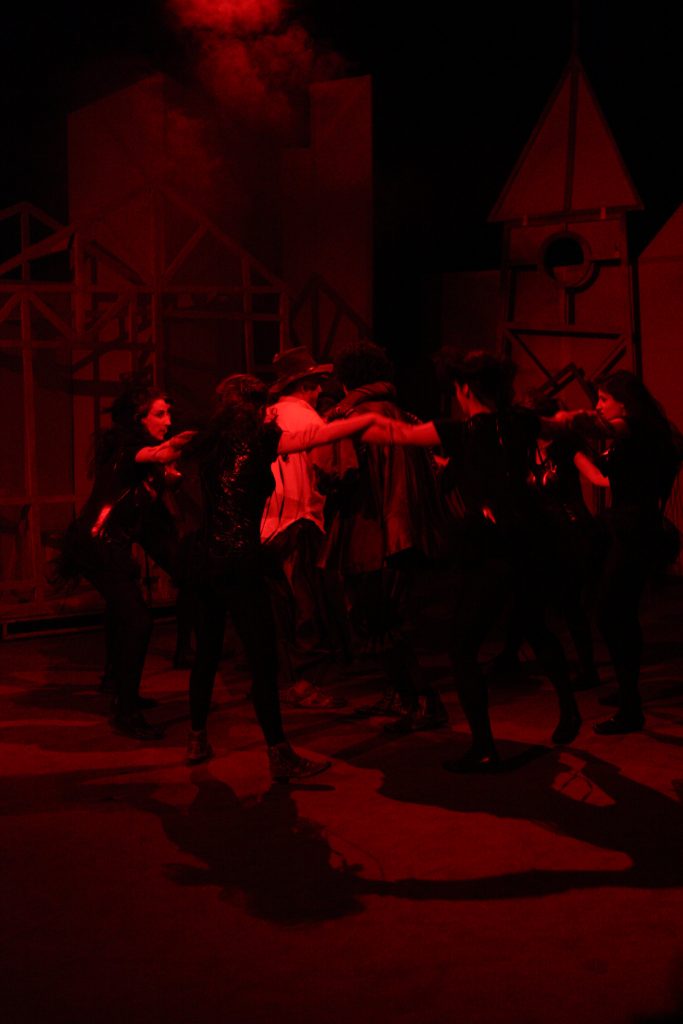
2005-2009
In 2005, the move to the new premises in Militari begins. On November 2, with the premiere of the show “The Mirror”, the official opening of the Masca Theater on Bd. Uverturii, after 15 years of nomadic activity. In this context, in just a few months, the projects Masca Festival, Masca Theater Meetings, Romanian Theaters on Tour at Masca, European Theater Festival “European Masks at…. Masca” – activities that become a tradition of the theater – and the first issue of the monthly newspaper Masca, in January 2006.
The premieres that have defined this new beginning are “Love in Bucharest” in a new vision (written and directed by Mihai Mălaimare, 2006), “The Cafe” (written and directed by Mihai Mălaimare, 2006), “Clowns” (written and directed by Mihai Mălaimare, 2007), “A Locomotive and a Railway Station” (written and directed by Mihai Mălaimare, 2007), “The Twins” (directed by Michele Modesto Casarin, 2007), “The Actor” (directed by Anca Florea, 2007), “The Lady with the Dog” (written and directed by Mihai Mălaimare, 2008), “The Sweepers” (written and directed by Mihai Mălaimare, 2008), “The Lovers” (directed by Michele Modesto Casarin, 2008), “Gurton’s Needle” (directed by Mihai Mălaimare, 2008), “Cocktail” (written and directed by Mihai Mălaimare, 2008), “Ghetto Blaser” (by Vava Ștefănescu, 2009), “The Guardians Are Back” (written and directed by Mihai Mălaimare, 2009), “Servant to Two Masters” (directed by Mihai Mălaimare, 2009), “The Stag King” (directed by Michele Modesto Casarin, 2009) and “The Princess of the Copper Castle” (directed by Cristian Pepino, 2009).
The productions of the Masca Theater are thus presented at numerous festivals in the country and abroad, including the International Theater-Imagine Festival in Târgu Mureș, the International Theater Festival in Sfântu Gheorghe, the International Experimental Theater Festival in Cairo (2006), International Theater Festival of European Regions in Hradec Kralove (2007), Euroregions Festival in Blagoevgrad, Romanian Comedy Festival “FestCo” – where we received the Award for ingenious artistic moments, “Babel Fest” Festival in Targoviste, and, on the occasion of “Sibiu – European Capital”, in Sibiu (2007). In the meantime, the group has been invited by the Romanian Cultural Institute to perform in Vienna, Alcala de Henares, Prague, Krakow, Warsaw, Burgos and Madrid.
In 2008, the Masca Theatre and its manager at that time, Mihai Mălaimare, receive the Special Award for performance in non-verbal theater at the UNITER Awards Gala. Moreover, “The Intruder” is the first Romanian theater performance broadcast live on the internet, on March 26, 2009.
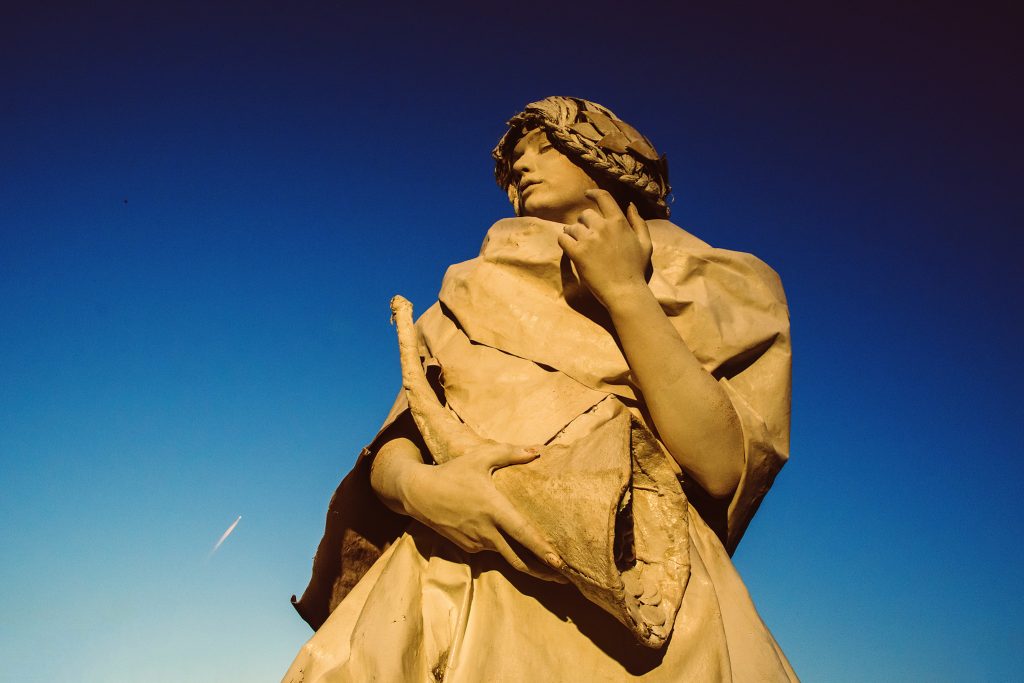
2010-2019
20 years after its foundation, the Masca Theater was awarded the Order of Cultural Merit in the rank of Knight, category “Performing Arts”, and 5 years later, in 2015, it was decorated with the Order of Cultural Merit in the rank of Officer.
The GrenadeIn the following period, Masca Theater moves towards the written text with its premieres, and there is an infusion of new directors with the “Words and Gestures” project: “Pierrot” (directed and written by Mihai Mălaimare, 2010), “Una Historia de Tango” (by Ioana Macarie, 2010), “Gigi Amoroso” (directed and written by Mihai Mălaimare, 2010), “Venexia” (directed by Michele Modesto Casarin), “There” (directed by Mihai Lungeanu, 2011), “Iunia” (by Ioana Macarie, 2011), “Ex Libris” (by Mihai Mălaimare, 2011), “A few slaps” (directed by Ioan Albu, 2011), “What do we do with the cello?” (directed by Lavinia Jemna), respectively “Grenada” (by and directed by Olga Delia Mateescu, 2011).
Other productions that leave their mark on this period are “The Comedy of Errors” (directed by Mihai Mălaimare, 2011), “The Beggar” (by Laura Dumitrașcu-Duică, 2011), “Salome” (directed by Răzvan Alexandru Diaconu, 2012), “Three Enchanted Princesses” (directed by Cristian Pepino, 2012), “The Beggar” (directed by Dominic Dembinski, 2012), “Amor, Signora and the Blue Canary” (directed by Mihai Mălaimare, 2012), “The Land Where Angels Come in Vain” (directed by Anca Florea and Mihai Mălaimare, 2012), “When Love Wears Slippers” (directed by Michele Modesto Casarin, 2012), “The Military Fanfaron” (directed and written by Mihai Mălaimare, 2013), “The Strike” (directed by Mihai Mălaimare, 2013), “The Park” (directed and written by Mihai Mălaimare, 2013), “Women’s Gossip” (directed by Mihai Mălaimare, 2013), “The Merchant of Venice” (directed by Michele Modesto Casarin, 2014), “Romeo and Juliet” (directed by Mihai Mălaimare, 2014), “Bucharest from yesterday” (directed and written by Mihai Mălaimare, 2014), “Scapino” (directed by Mihai Mălaimare, 2014), “The Comedians” (directed by Michele Modesto Casarin, 2015) – which concludes the Commedia dell’ Arte project of the Masca Theater, “Parapanghelos” (directed by Mihai Mălaimare, 2015), “Pulcinela’s Secret” (directed by Mihai Gruia Sandu, co-production with UNATC Bucharest, 2015), “The marriage” (directed by Mihai Mălaimare, 2015), “The Broke Vase” (directed by Mihai Mălaimare, 2015), “The Ivy” (written and directed by Mihai Mălaimare, 2016), “Forgotten times of dragons” (written and directed by Mihai Mălaimare, 2016), “Spring breeze through the orchyard” (written and directed by Mihai Mălaimare, 2016), “Nastasia” (directed by Mihai Mălaimare, 2016), “The Sailors” and “The Parisian” (written and directed by Mihai Mălaimare, 2017), “Baroque” (written and directed by Mihai Mălaimare, 2017), “Invasion” (written and directed by Mihai Mălaimare, 2017), “House of Madmen” (directed by Mihai Mălaimare, 2017), “Yvonne” (written and directed by Mihai Mălaimare, 2018), “Us” (written by Mihai Mălaimare, directed by Mihai Mălaimare and Anca Florea, 2018), “The Sailors – Return to the Sea” (written and directed by Mihai Mălaimare, 2018), “The Fair” (written and directed by Mihai Mălaimare, 2018), “The Cries of Paris” (written and directed by Mihai Mălaimare, 2018), “Loochy and Moochy” (directed and written by Andreea Vulpe, 2018), “The Dream” (directed by Mihai Mălaimare, 2018), “Human Stupidity” and “The Wedding” (concept and directed by Anca Florea and Mihai Mălaimare, 2019), “Cargo Theater” (by Laura Dumitrașcu-Duică, 2019)
Touring and traveling in the country and abroad continues with multiple performances at events such as the Classfest Festival in Chisinau, the Fortres Theatre Festival in Serbia (2013), the Smederevo International Theatre Festival (2014), the European Theatre Workshop in Ruse (in 2013, 2015 and 2016), Theater Festival in Novi Tvrđava (2016), Night of Festivals in London (2016 and 2018), Living Statues Festival in Ruse (2018 and 2019), Hat Fair Festival in Winchester (2018), as well as performances in celebratory contexts in the cities of Vienna, Lisbon, Bratislava, Berlin, London, Sofia, Vienna, Brussels and London.
Since 2011, Masca Theatre organizes 9 editions of the International Festival of Living Statues, which brings to Bucharest performances of living statues from England, Germany, Holland, Italy, Spain, Portugal, Serbia, Austria, Austria and the United States of America.
“Caietele Masca”, the first Romanian publication on street theater, is launched on March 17, 2017, each issue is dedicated to a research topic that concerns the alternative theatrical space. The publication contains a series of articles, interviews, essays, dossiers and reports of interest to both theater professionals and the general public. In January 2020, they are launched in online format on the caietelemasca.ro platform, alongside a series of digitized books by Mihai Mălaimare.
2020-2023
During the pandemic crisis, Masca Theater is operating in a hybrid system. The first premiere of the year is “Lenin’s Ark”, performed in a mixed mode (both live and recorded) outdoors. This period is marked by such productions: “My Statues, Part I – Bronze”, “My Statues, Part II – Sand”, “Two Broken Toys” (written and directed by Mihai Mălaimare, 2020), as well as a performance-film, performed exclusively online: “The hardest is to talk about yourself” (written and directed by Anca Florea, 2020).
Among the titles to be staged in the next period are the premieres of “We Kissed After the End of the World” (written and directed by Mihai Mălaimare, 2021), “Pantomenia” (by Anamaria Pîslaru, 2021), “Bucharest Deliver” (written and directed by David Schwartz, 2021), “Best of Living Statues” (written and directed by Mihai Mălaimare, 2021 – premiere at the Ruse International Festival of Statues), “About Love and Other Balderdash” (written and directed by Mihai Mălaimare, 2021), the performance “Refugees” (2022, programmed before each performance), “The Exodus” (concept Anca Florea, written and directed by Mihai Mălaimare, 2022), “A perfect murder (The Angels from Văcărești)” (written and directed by Mihai Mălaimare, 2022), “Jilava – I set a building on fire” (written and directed by Ioana Păun, 2022), “The Train Station” (written and directed by Mihai Mălaimare, 2022), “Romanians at the Gates of the World, parte I, bronze” and “Masca’s Hub, parte II, porcelain” (written and directed by Mihai Mălaimare, 2023) and “Clowns” (written and directed by Mihai Mălaimare, 2023).
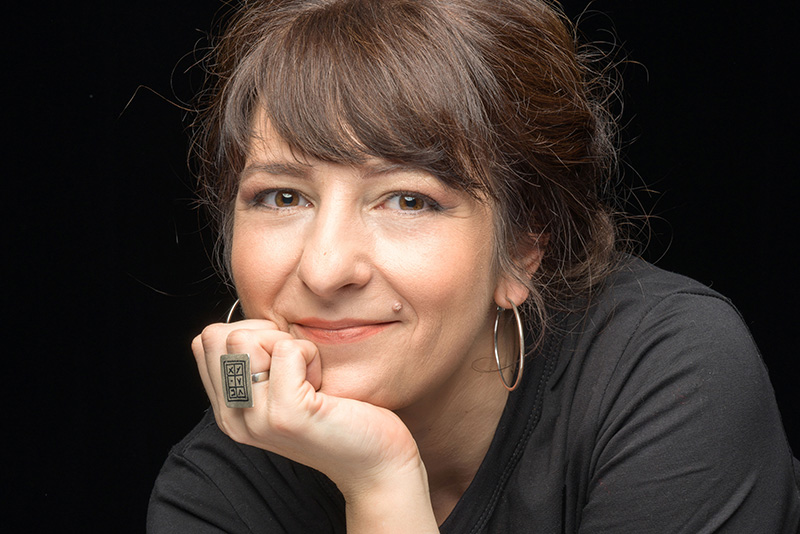
2023-present
The appointment of director Catinca Drăgănescu as interim manager of the Masca Theater at the beginning of the 2023-2024 season marks a turning point for our institution. We are thus in a moment of artistic reimagining, in which we are trying to redefine our specificity. Keeping the alternative spirit that consecrated and gave life to this theater, we are turning towards an art theater with topical themes, and we aim to become the first ecological theater in Romania.
The productions that are part of Masca Theater’s repertoire are: “Crisis. Survival Kit” (by Mihaela Michailov and David Schwartz, 2023), “Summit” (concept and direction Florin Fieroiu, 2023), “Caracatița” (concept and direction Catinca Drăgănescu, 2024), “The Death and Life of Bulă or the Romanian Identity Myth” (workshop-performance by Alexandru Ivănoiu, co-produced with IOTA Association, 2024), “The Saucer” (by Maria Manolescu and Dragoș Alexandru Mușoiu, 2024) and “nOu” (directed and dramaturgy by Selma Dragoș, 2024).
In 2023, we are initiating “Open Talk ” – a series of monthly performative debates on topics “that we don’t talk about”, with Alex Tocilescu – and “Theatre Today – meetings at Masca”, a project dedicated to professionals in the field of performing arts, an initiative of Teatrul azi magazine in partnership with Masca, with the support of UNITER. Moreover, we are launching the programs Open, a micro-season of guest performances from other theatres in the country, and Masca Teen – theatre as an alternative educational platform.
